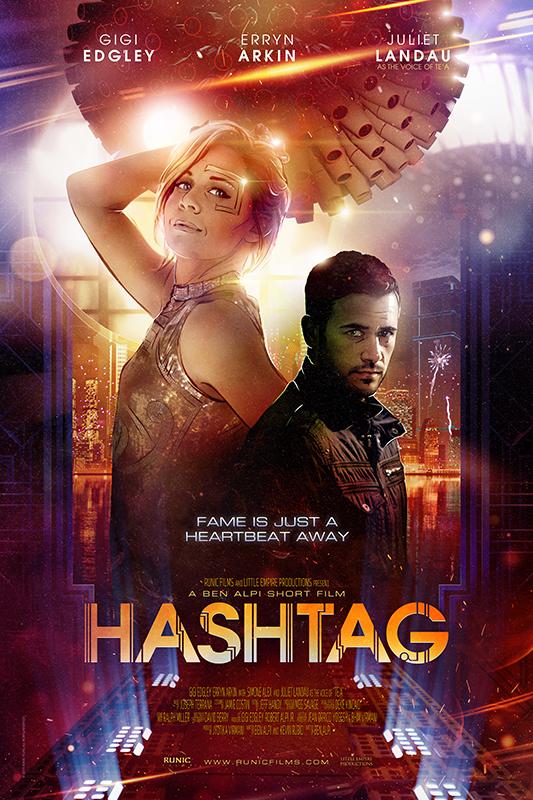
Ben Alpi
An award-winning director and writer based in Los Angeles, Ben is currently on the festival circuit with his latest short film, Hashtag. The science fiction thriller won the top shorts prize “Best Short Film” at the Gen Con Film Festival and has been nominated for 5 other festival awards. Hashtag is screening on 3 continents at some of the most prestigious festivals including HollyShorts, LA Shorts, Comic-Con International Independent Film Festival, FilmQuest, and Sci-Fi-London. The film confronts our society’s growing obsessions with fame, physical appearance, and instant gratification. The film also stars Juliet Landau (Bosch, Ed Wood, Buffy the Vampire Slayer) as the voice of A.I. assistant “Te’a” and Erryn Arkin (CSI, Home and Away) as the mysterious stranger.
Ben began his film career as a visual effects artist and as a director/producer of industrial films. After its festival run and a limited theatrical release, his first narrative short film, the heartfelt drama Silver Lining, was signed into broadcast on PBS and Movieola, and into distribution with Ouat Media. Brought onto the award winning Star Trek: New Voyages/Phase II, he became the series second unit director for episodes “Blood and Fire” Part 1 and Part 2, “Enemy: Starfleet”, and “The Child”. He also directed the second unit for the forth-coming feature-length documentary Benedict Arnold: Hero Betrayed. In 2010, Ben was co-executive producer on the family sci-fi adventure series eScape v1.0. Also a character actor on occasion, Ben starred as the “adorably incompetent” alien starship captain “Zerks” in the 2009 sci-fi comedy Web series Zerks Log.
Q & A
If the world you created in your film became a reality, is that a world you would want to live in? Is there a Sci-Fi world you’d buy a one-way ticket to?
I wouldn‘t want to live in the Hashtag world—although, we’re almost there now! Three times as many children today want to become a ‘Youtuber’ than an astronaut. Given the film is a cautionary tale about the folly in fame, it’s probably obvious that watching live-streaming ‘influencers’ as my central entertainment wouldn’t be my thing. Now, what sci-fi world would I want to live in? Easy answer would be Star Trek, probably leaning towards the Next Gen era. Replicators, Warp 9, holodecks, very little disease, no more economic stratification, abundant peace, and people who concentrate on science, exploration, art, and working together to improve themselves and the human condition. Bliss.
Name a Sci-Fi character you relate to on a spiritual level? Who is your Sci-Fi spirit animal/spirit alien?
The character I most identify with is probably Luke Skywalker, the farm boy trapped in a backwater town. I’d have loved for them to explore Luke’s further development after his initial arc—possibly he has ‘imposter syndrome’ or the like and has to contend with that. The character who I see more as a guiding light would probably be The Doctor. One of the ways he, now she, helps people is by trying to stay ahead of the situation. He’s always thinking ahead, taking in new information, adding it to the equation, and he’s completely without prejudice. He’ll take a good idea from anywhere to save the day. He also has the confidence that in all of space and time, he’s exactly where he’s meant to be. I think we all could gain that confidence if we realized the same.
Friend or Foe: humanoid robots with advanced artificial intelligence? What if robots start making their own Sci-Fi films? Will you support them in their endeavors?
I think AI will become even cleverer over time, but I’m not sure it will have the creative impulse of humans—at least not in my lifetime. Sure, you can input screenplays as data and the AI will be able to spit out a plausible narrative, but it would not have thousands of years of human experience to resonate with. In the end, it will be mimicry at best. So, I’m not really threatened. Until Skynet, anyhow.
In 1996, Bugs Bunny recruited Michael Jordan and Bill Murray to form the greatest basketball squad of all-time, the Tune Squad; you’re Bugs, who’s on your Sci-Fi Tune Squad?
If I’m forced to choose people who I haven’t worked with yet, I’d have to say Sir Ian McKellen, Viggo Mortensen, Rosamond Pike, Saoirse Ronan, DP Fabian Wagner, and Peter DeLuise producing.
You’ve gotta go through some bad ideas to get to the good ones. Tell us one of your bad ideas. How do you get past the bad ones to find your spark?
I’m not sure if it qualifies as a “bad” idea, but while in high school, I developed a visual story to go along with the Rush album 2112. With the help of a good friend, I poured hours and hours into adapting and broadening the story, developing the characters and their ‘future history’, and their technology. It was a massive undertaking for a kid in rural NY whose only clue about how movies were made was from scant behind-the-scenes documentaries whenever I could find them on TV, the Movie Magic series, and my own experiments on VHS. It will never see the light of day, but I learned a lot!
Do you consider yourself part of a sci-fi community? Or when your brain is in the future and your body’s in the present, is that isolating?
My wife used to often say, “The geeks shall inherit the Earth.” Growing up, there weren’t many kids my age to geek out with or to play D&D with, but luckily my family was into any and all sci fi and fantasy. The 80’s were the heyday of Saturday Morning Cartoons, the advent of video games, Star Wars, Star Trek, Indiana Jones, anything from Jim Henson, TRON, The Last Starfighter, Highlander… a paradise of geeky fun. My friends and I started watching Doctor Who around 9-10 years old, staying up into the night since PBS played entire ~2-hour stories. Another friend introduced me to Monty Python, and I’m forever in his debt.
Do you consider yourself more of an analog or digital person? What kind of balance do you strike between the two? Is there a disconnect between the technology you make films about and the technology that you make films with?
I do use a lot of digital tools, but I prefer reading books and scripts on paper, writing notes by hand, drawing on paper—it keeps me in touch with the corporeal world. In filmmaking, I’m pretty down-the-middle. I’ll always want to shoot on film for the fantasy element it inherently adds, not to mention its color and light rendering which still has no equal. Digital cameras have improved by massive leaps, but still seem to muddy colors at the same time they over-sharpen. And although sharpness and high shutter angles have their place, I like motion blur. For effects, coming from digital visual effects, there are many situations where it works better or is more flexible than physical special effects, but there are many situations where physical is actually faster, cheaper, and better. I see so many situations where it would have been so much better for a small team spending a week creating the thing using physical effects and costumes rather than the several weeks of an entire department or company doing the thing in post. You often hear about building a set helps the actors—but it helps the entire team by being able to see and modify on-set. It forces us to think ahead and could save months of post.
When you’re creating the props and sets that make a new world, where do you look for inspiration? How do you create objects that are relatable but unfamiliar?
I knew the obvious choice for Hashtag would be post-modern: stark and flat and gray, and I really wanted to do something different. We didn’t have the budget or time to do anything truly extravagant, but one of the reference images from my production designer, Meg Savage, reminded me of Art Deco. That in turn reminded me of how human-focused that was—our audacity, our triumphs over nature, our brains and brawn so I asked, “What if Art Deco originated not in the industrial revolution, but the digital/social media revolution? To humanity's supposed triumph over its own nature through high technology?” I had been researching designs for quantum computer chips and circuit boards and they look remarkably like Art Deco so it made sense. I think there is an unfortunate trend in film where mood and visual communication take a back seat—makers are not given enough time or money and are forced to take shortcuts. And the end result is one film ends up looking much like another. Even though we were a short film, I wanted to see if we could go against the normal dystopian look and instead use bright colors and slick visuals to candy-coat the pill we were delivering.
Lightning round: Star Wars or Star Trek? Philip K. Dick or William S. Burroughs? Practical or CGI? Dystopia or Utopia? Post Apocalypse or Pre-Apocalypse?
Both! Edgar Rice Burroughs Both! Anarcho-syndicalist commune. (Okay, utopia) Avert Apocalypse!
Do you think science fiction, or any stories of any genre, can bring about change in the world?
I think this sort of question relates directly to the world I created for Hashtag—sure it’s trying to warn the audience that fame is a questionable life goal, but it’s also an illustration of what our society could become on an even wider scale if we keep on our present course. I still hear people discounting art and literature, saying they are luxuries or frivolous, but without experiencing all the different points of view, taking all of the passion and creativity we enjoy away, all the entertainment, our lives would be empty and silent, lacking in purpose and inspiration. I would wager that writers, artists, and musicians save just as many lives through their works as physicians. We as humans need these kinds of enriching experiences to broaden our view, to quicken our pulse, to understand different cultures. Without it, we’ll be doomed to suffer through our shortened lives trapped in the tiny echo chamber that is our social media feed. But you’ll have to wait for the Hashtag feature film for that!


